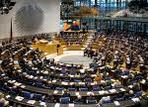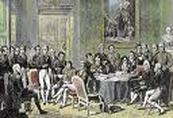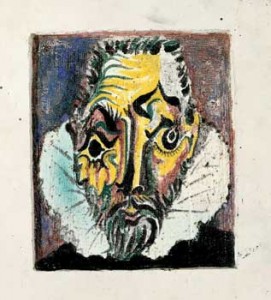
Defining society (our public life and interdependence) and politics (our public affairs and tasks) are interrelated the same way as questions with answers, and problems with solutions. What is the problem with society? The basic task of politics depends on this question. What is the principle task? How I see society depends on this question.
Many in the modern political life have been disillusioned from politicians and through this from politics, and one consequence of all this is that some politicians deny being politicians and so they talk politics by denying talking politics. In addition to that, more and more people confuse politics with wrong politics, even though politics means nothing other than the ‘managing of public affairs’. Therefore making politics is unavoidable and each and every issue of each and every person includes the political and social importance of that particular issue. It is a sovereign political will (e.g. in the modern world) not to consider the political importance of every affair and to stop at the borderline of personal life when dealing with public issues. It is a separate political problem where to draw the line between private and public affairs.

- How much freedom can we allow and to what extent should we limit each other?
- To what extent should we compete and to what extent should we protect each other?
- To what extent can we accumulate the social advantages and disadvantages?
- How can anyone’s absolute power be avoided?
- How is society really stratified and how does the proportionate (both quantitatively and qualitatively well-balanced) representative system look like?
- Where should the line between the authority of central and local administration be drawn?
- When is a society on the right track?
- Who can determine what is socially ‘normal’?
- Should we control consumption, the use of natural resources, or population growth?
- Should we control the spread of certain addictions (e.g. alcohol, tobacco, drugs)?
- How possible and necessary is it to eliminate or to compensate the inequalities of people (e.g. women, children, elderly, disabled, immigrants, minorities)?
- For what and to what extent should violence be used?

All schools, however, agree that a rational political decision can be made without taking into account the purpose and meaning of human life. Neither modern politicians nor modern voters are interested in where humanity’s path leads to. We give priority to short term problems over long term ones just like we prefer local problems over global ones.
Political schools connected to the church see the meaning of human life in serving God and in the preparing for judgement, but nobody knows from this what God’s will is and what exactly need to be done since God’s will is unknowable and religious leaders are imperfect.
All of the above are mostly preoccupied with seizing and keeping power, and with the distribution and consuming of goods. The ‘achievers’ focus on the extension of individual consumption while the ‘revokers’ aim to extend the consumption of their consanguinity which they consider to be superior. And these are just the theoretical problems.

Conspiracy theories are still popular to date, and those are correct in a sense that there are various power groups attempting to seize power by well disguised steps. Nevertheless, the social and economic interdependence, the complexity of changes, and the billions of intertwined issues guarantee that even if presuming an uninterrupted monitoring and decision-making capability (quite impossible though), still not everything can be known and controlled. Furthermore, we become aware of even the key events afterwards and with delays, not to mention the fact that when taking action the resources are extremely limited compared to the number of tasks.
One self contradiction of modernity that prides itself in professional competency is that –apart from the plain power struggle- delays, flurry, uninformedness, and illogicalness characterize its public actions. (The unbelievable fortunes being wasted on hostility and luxury by ruling groups show the extent of stupidity, while the social miseries could significantly be reduced even from just a fragment of that). The logicalness of political theories is also weak, but even weaker is the political practice and ‘intentionally’ illogical (mood-appealing, simplifying, and engraving) is the political communication.
The strongest political ideologies of modernity
Liberalism (‘laissez-faire’) wants the independence of the ‘rationally selfish’ individual. It says that the control of the smallest possible state maintained by the smallest possible taxes should assure the freedom of both the individuals and the supply’s competition. There are different versions of Liberalism depending on to what extent it allows state control. It is particularly sensible to individual rights of freedom and is the permanent basis of civil rights movements and the legal protection of minorities. Its conception of ‘justiceness’ is self-contradictory since it also supports the competition of unequal players. Its concept of ‘justiceness’ is contradictory since it regards the self-eliminating (e.g. selfish, wasting) independence as equal to self-progressing (e.g. providing, far-sighted) independence. Its most famous philosophers are Thomas Paine (1737-1809), Thomas Jefferson (1743-1826), Alexis de Tocqueville (1805-1859), John Stuart Mill (1806-1873), John Dewey (1859-1952), and Ferdinand A. Hayek (1899-1992).
Marxism wants to eliminate social oppression and deprivation in such a way that the victims of oppression take over power from the beneficiaries of oppression. It sees the fundamental reason of social inequalities in the power accumulated by private property therefore it attempts to end oppression in general by abolishing private and establishing public properties. There are different versions of Marxism depending on whether it applies peaceful or aggressive methods (social democracy vs. communism), and based on which victim class it relies on the most (Leninism, Maoism). It is extremely sensitive to deprivation and poverty and is the permanent basis of trade unions and movements fighting against the exposedness and exploitation of employees. Its most famous philosophers are Karl Marx (1818-1883), Friedrich Engels (1820-1895), Eduard Bernstein (1850-1932), Vladimir Ilyich Ulyanov /Lenin/ (1870-1924), Antonio Garmsci (1891-1837), Mao Zedong (1893-1976), and Ernst Bloch (1885-1977).
Racism sees the origin of social problems in the biological capabilities of people therefore it would eradicate the ‘bad’ and breed the ‘god’ people. It says that society should be stratified based on the purity and excellence of bloodline and that the inferiors should be unconditionally and unlimitedly obedient to the superiors. It says that birth and the extent of the possessed power justifies abilities. There are different versions of racism based on which ethnicity it regards the best and which one the worst. It is extremely sensitive to superiority and is the permanent basis of militaristic and race-discriminating movements. Its self-contradiction is that it regards itself as the precondition of truth therefore it places itself above all criteria and principles. It self-contradicts to its own valueness because it establishes its valuableness on the relative superiority against its ‘invaluable enemies’. It contradicts to its own roots because it denies both the universal human ‘goodness’ and the naturalness and usefulness of differences. It contradicts to all scientific and everyday experiences that find both outstanding and well below average performances in the case of each and every ethnicity. It does not understand the ultimate importance of culture, education and learning. It is prejudice being independent from logics and facts. It denies the creative power of free critics and it would build power based on fear and blind submissiveness that eliminate open communication and unbiased understanding and by this these eventually eliminate the enrichment of knowledge and social creativity. Racism regards compassion and equality as the proof of weakness and incapability and therefore it destroys the resources of social cooperation. Similar to a parasite or a cancer cell, it is a self-eliminating system that eats up the reserves and achievements of a previous system. Its most famous advocates are Houston Stewart Chamberlain (1885-1927), and Adolf Schicklgruber /Hitler/ (1889-1945).
Conservativism aims to restore the medieval order-society in which people who are unequal based on birth and possessions are in a family-like relationship in which the rich national elite leads the folks towards a growing existential security with the help of a non-parliamentary nation state that isn’t divided into the three branches of government. It is particularly sensitive to existential security and tradition-based truth interpretations. Its self-contradiction is that it idealizes the rich and the church, and that it attempts to freeze power struggle with power struggle and eradicate violence with violence. It subordinates social mobility, flexibility and creativity to the non-criticizability and non-exchangeability of the ruling groups with which it depletes social capacities and undermines existential security. It denies the progression of progression in a changing world. Its most famous philosophers are Benjamin Constant (1767-1830), Karl Ludwig Haller (1768-1854), Francois Pierre Guizot (1787-1874), Thomas Carlyle (1795-1881), Friedrich Christoph Dahlmann (1785-1860), and James S. H. Maine (1822-1888).
All of our solutions are captives of inequality, unjustfulness, imbecile consumption, and spontaneous breeding. We expect and hope caring instead of willing it and taking it. We have not grown up.





 RSS Feed
RSS Feed
